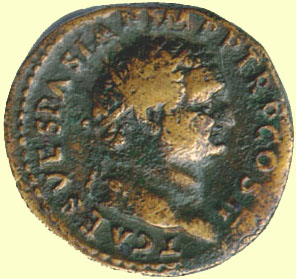 Contents --
Previous Article --
Next Article
Contents --
Previous Article --
Next Article
Many unfortunate disasters occurred in the Roman Empire during the reign of Titus. An epidemic of plague swept the empire, fire burned in Rome for three days, and Mount Vesuvius erupted on the Bay of Naples, burying Pompeii and Herculaneum and killing thousands of people. Much of Titus’ reign is marked with his acts of kindness in trying to ease the suffering of his unfortunate people. Titus succeeded his father as emperor after his death. He had been Caesar under his father Vespasian during the last few years of his reign and helped Vespasian to govern wisely. However, during his father' reign, Titus had arranged for some of his opponents to be put to death, He had some of his supporters stir up rumors about these men in the army camps, causing some of the soldiers to clamor for their deaths. Titus then obligingly put them to death. This treachery made Titus quite unpopular with many people because they saw through the trick. By and large, these acts of political assassination committed during his father' reign are the only blots upon his record as a merciful and enlightened ruler. The tragic destruction of Jerusalem in A.D. 70 occurred while Titus’ father Vespasian was emperor. It had been a long and bloody struggle and the victorious Roman soldiers put the Temple to the torch, slaughtering the helpless Jewish refugees who had fled there to hide from the rampaging legionaries.
Titus fell very much in love with Berenice, the Jewish queen and sister of King Agrippa II. Together, Agrippa and Berenice ruled parts of Palestine and Syria as client king and queen of Rome. Though they cooperated with the Romans, some of their subjects did not, starting a bloody rebellion that ultimately led to the destruction of Jerusalem and the Temple. Most of the Roman citizens sharply disapproved of the affair between an heir to the throne and a foreign queen, much as they had when Julius Caesar and Marc Antony had tried to make Cleopatra their queen. Sadly, Titus sent his one true love back to Jerusalem in order that he might not offend Roman society.
The Colosseum, or Flavian Amphitheater, was completed during the reign of Titus. It was in this arena that Roman citizens satisfied their lust for violence by witnessing the bloody combat between gladiators that was to continue for more than three hundred years. Criminals, prisoners of war, slaves, professional gladiators, and Christians died in these combats between men or between man and beast to provide a spectacle for Rome' citizens. Titus died after a short illness after having reigned two years and two months. There was a rumor that his brother Domitian poisoned him, but there is no real evidence to support the accusation.
Go to next article on Emperor Domitian
Go back to previous article on Emperor Vespasian